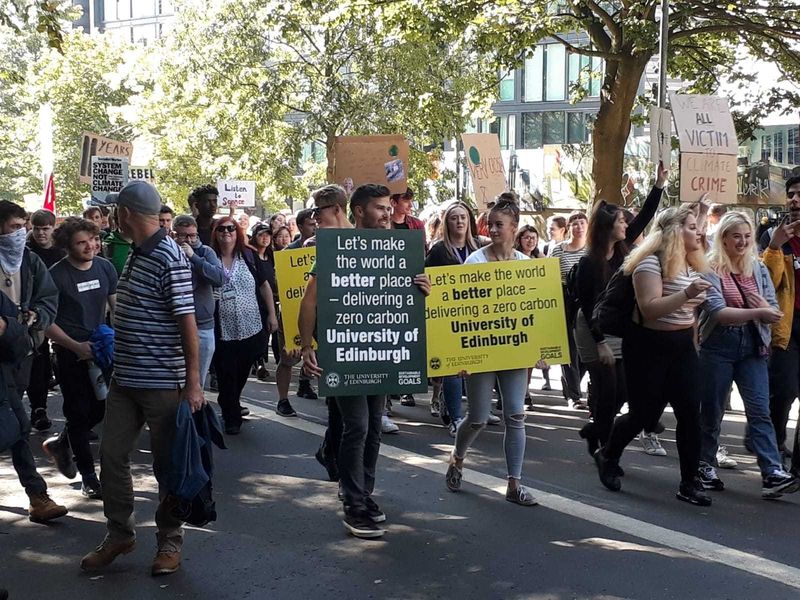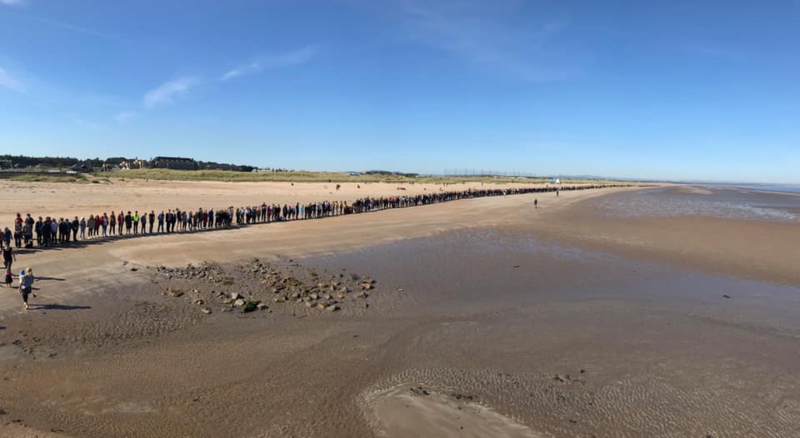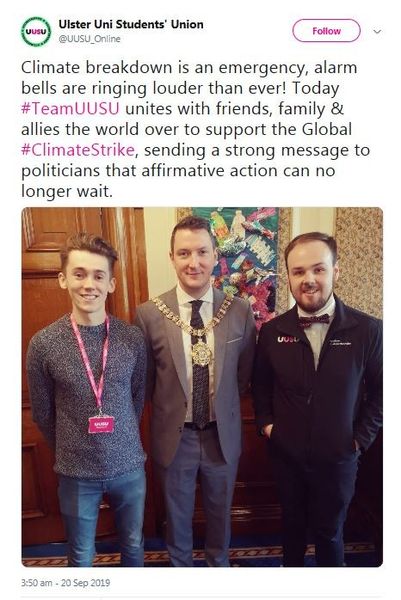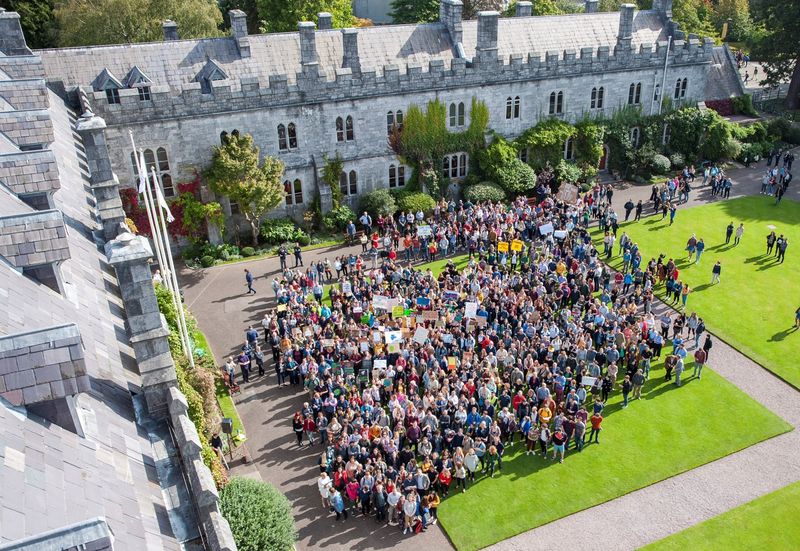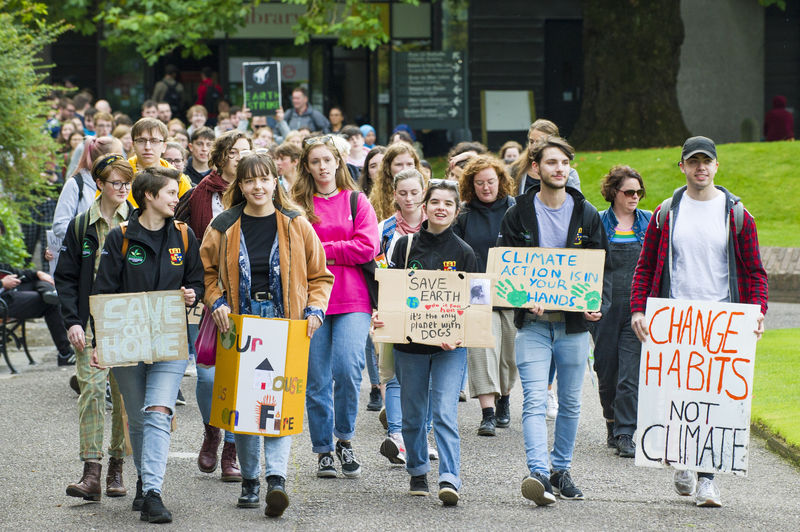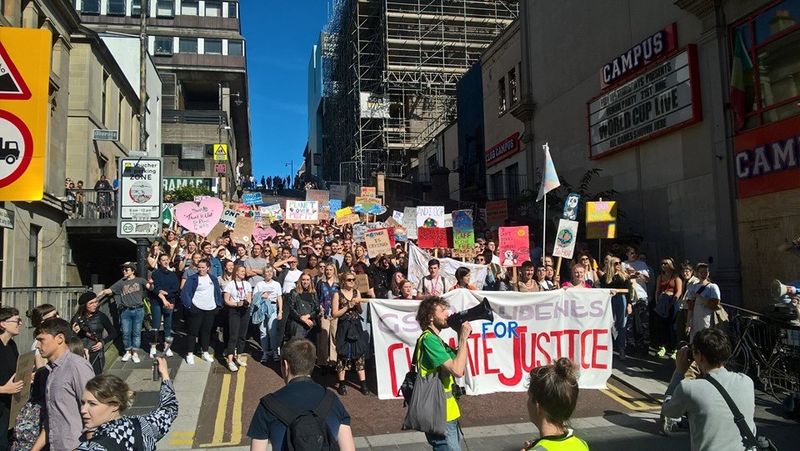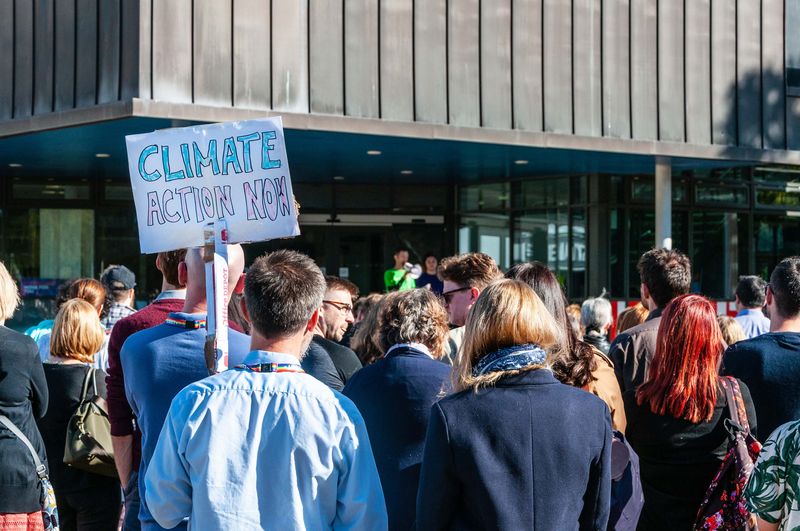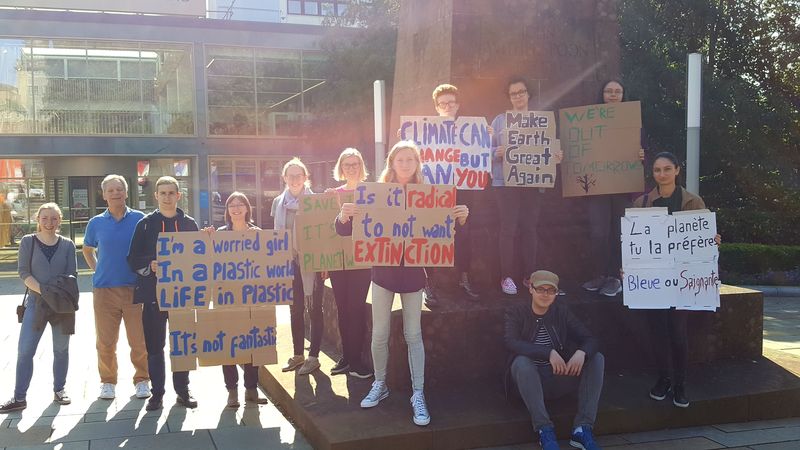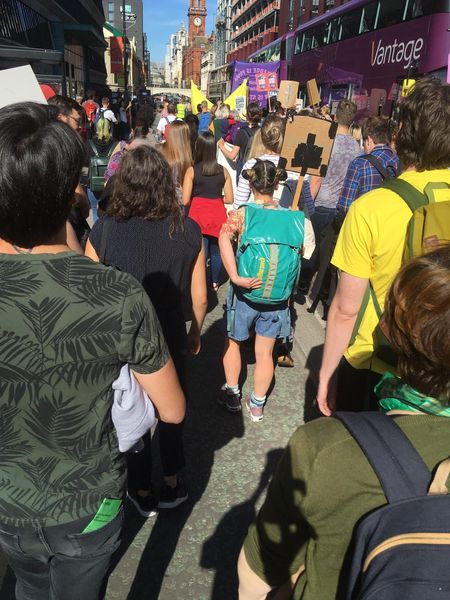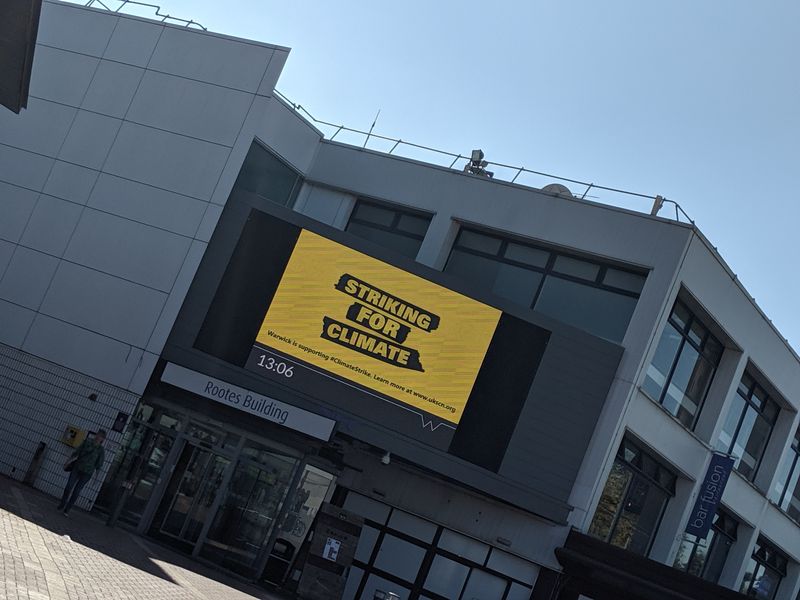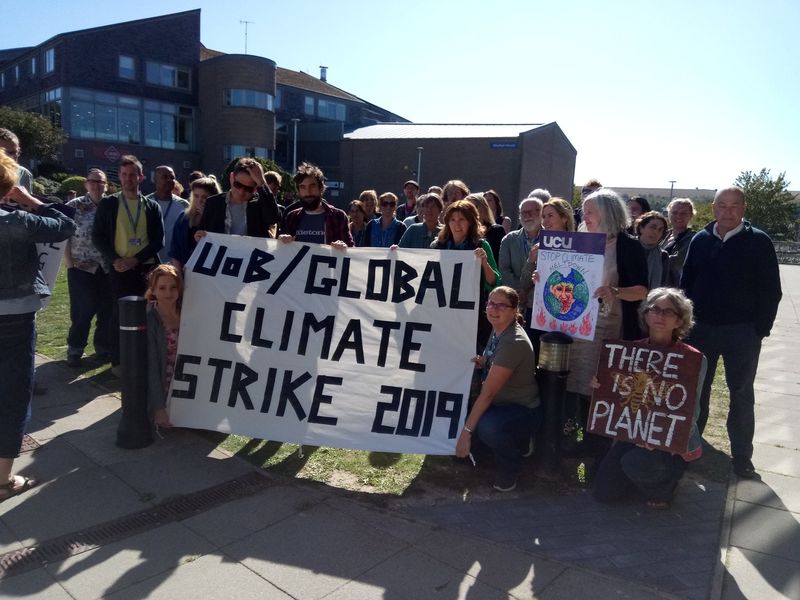Global Climate Strikes - a change in the tide at UK and Ireland universities and colleges
The pictures of a lonely Greta Thunberg sat outside the Swedish parliament building last year, alongside the sea of faces that took part in the Global Climate Strikes last Friday, are being used to show the stark contrast.
In just over a year the climate strikes have had more impact on global governments than decades of scientific research warning of melting polar icecaps and a depleting ozone layer. We should not be proud of the general complacency most people have shown this increasingly catastrophic issue – but we certainly should be proud of the young people that have given up their time and education to protest this violation of their future over the last year. They have driven this movement to the heart of policy the world over and gradually we are starting to see world leaders and major organisations wake up to these issues.
Here in the UK and Ireland, we have seen some movement on the climate crisis agenda this year, with the Government declaring an Environment and Climate Emergency in May 2019. On the 12th June 2019, the UK became the first major economy in the world to pass laws to end its contribution to global warming by 2050. Since then, a large amount of Government attention has been taken up by Brexit.
It has always been clear to us that the education sector must take the lead in the fight against the climate crisis. Universities and colleges have a responsibility to show foresight and leadership on matters that affect their students’ futures.
We asked members back in March about their institutions and the climate change strikes. The response was disappointing. On a personal level 92% of members were supportive of the strikes. However, only 30% of members said their institution was doing anything to support the strikes. Most of the support was coming from the Students’ Union or individual staff members, with only 6% of members stating their institution as a whole was supportive.
We then asked members what you thought universities and colleges should be doing to ensure students are heard on this topic. Overwhelmingly the answer was to listen and support them. We also asked what you thought our role as an organisation should be, and the answers varied, but mostly it was felt we should be lobbying senior management in institutions to support the climate strikes and recognise the climate crisis for the emergency that it is.
Well, we have been working hard to do just that. This year, EAUC has declared a Climate Emergency and encouraged institutions to follow suit. We have worked with the UN and Second Nature on a Global Climate Letter that has raised awareness of the need for a climate emergency to be declared globally, and the input needed from Higher and Further Education. Institutions representing 3,146,617 students have committed to this so far.
We have facilitated a think tank, a collaboration across the sector that has created a Climate Emergency Framework. We are currently planning a Climate Change Commission in November that is set to have a great turnout of executive level staff, ready to talk about how they can play their part in the Climate Emergency.
The Global Climate Strikes last week were a turning point – for the first time the change in tide at UK and Ireland institutions was tangible. We want to share this with you. From six months ago, when institutions were doing very little to address the climate crisis formally, to the display of solidarity on Friday. It is truly a step change.
Here are some examples:
University of St Andrews
Summary: Senior staff were supportive of staff and students striking, a 5 minutes silence was observed, and students organised a ‘line in the sand’ event.
Detail: The most symbolic event was the ‘line in the sand’ event organised by Climate Action St Andrews and the St Andrews Students’ Association. Students and staff were encouraged to join the event supported by senior staff. They were also requested to observe the 5 minutes silence in aid of climate change awareness. 1,200 students, staff, and local residents held a strike in the university’s main quad, and then marched through the town to the West Sands Beach where, after speeches, they formed the single half mile long “line in the sand” and held a 5 minute silence for the environment. The University are holding a full week of climate action events (Green Week) during the Scottish Government’s Climate Change Week from 7th October.
A 3 minute drone video was made of the event.
Ulster University
Summary: Vice-Chancellor gave permission for staff and students to take part in the 30 minute climate solidarity stoppage. The Students’ Union organised strikes in Belfast and Londonderry.
Detail: With over 25,000 students and approximately 2,000 staff, the University’s day-to-day activities have a considerable impact on the environment, and it is committed to managing its environmental impact through key initiatives both planned and in place to improve environmental performance.
Given this commitment to environmental issues, the Vice-Chancellor, Professor Paddy Nixon granted the University’s support to the lunchtime stoppage of 30 minutes for those staff and students who wanted to participate.
Ulster University Students’ Union led the charge – organising climate strikes in Belfast and Londonderry.
Bridgend College
Summary: Encourage staff and students to strike, facilitated pledge boards, and played David Attenborough’s ‘Climate Change: the facts’ across campuses.
Detail: Students and staff at Bridgend College joined the millions around the world who stood up and made their voices heard in a bid to tackle climate change. The College encouraged everyone who wanted to support to wear green and congregate collectively in the canteens of its campuses. Pledge boards were set up for anyone who wanted to sign, pledging to learn how to play their part in making a difference to climate change. David Attenborough’s critically acclaimed film made by the BBC, ‘Climate Change: the Facts’, was screened across campuses throughout the day. Staff and students were invited to share on social media, using the hashtag #GreenAt1215, what they were doing to in an effort to tackle climate change.
The college outlined its status as the first College in Wales to sign the international Sustainable Development Goals (SDG) Accord as a strong contributing factor to its support the Climate Strikes and its commitment to social justice, well-being, and sustainability.
Principal and CEO of the College, Simon Pirotte, said: “This is a challenging agenda and the contribution required is both substantial and sustained, but also absolutely necessary.
In order to meet these commitments, we will take action on a number of concerns, mainly teaching and learning, estates operations, responsible investment, renewables opportunities, collaboration and partnerships. Further, we will continue to develop our climate change risk analysis and carbon action plan.”
The Principal will soon be going to London as part of a team of leaders from Higher and Further education, and other important groups who’ll be putting together a plan to tackle climate change in the UK as part of an EAUC initiative.
University College Cork (UCC)
Summary: UCC declares it ‘supports the voices from a generation, that will be most impacted by climate change’. Huge ‘stand in solidarity’ with support from president and dropping of green flag to half-mast in recognition that there is more to do towards the Climate Emergency.
Detail: UCC organised a 30 min ‘stand in solidarity’ where students and staff came together on the Quad. It was held at 11.30am so that anyone that wished to could then join the march in the city at 12.20. A week earlier the deputy president issued an email to all staff, citing that due to its membership of EAUC and signing of the SDG Accord 'UCC supports the voices from a generation, that will be most impacted by climate change', and as a ‘green campus’ – the institution had a duty to support the strikes.
At the event there were speeches from UCC’s president, deputy president, student union deputy president and environmental society chairperson. It held its Green Flag at half-mast for the duration to show that there is so much more that needs to be done to address climate action.
A video is available here.
Plymouth Marjon University
Summary: Used the opportunity of the Fresher’s Fayre to discuss whether the University should declare a Climate Emergency.
Detail: Friday, 20th September coincided with the University’s Fresher’s Fayre. Staff set up a stand asking students if they would be keen for the University to declare a climate emergency. Over 200 students came along and said yes – and put forward ideas for what action would look like.
The University is now working on an event to encourage its staff and student body to set out aspirational targets for what they would like the University to do in response to this. This will be inspired by the ‘People’s Assembly’ method, by using experts to inform and then student and staff to decide what they ought to do.
University of Gloucestershire
Summary: The University of Gloucestershire's student society 'The Green Team' organised a thousand-person march in Cheltenham.
Detail: You can read all about the successful march organised University of Gloucestershire students here.
University of York
Summary: The University allowed staff and students time off to strike, hosted climate action lectures, exhibitions and incentivised sustainability in their cafes.
Detail: The University did a number of different activities in support of the day of climate action. Staff were given 30 minutes additional time off during the day to join the local climate strike in York. A short open talk on climate change and the circular economy was held by two prominent staff from the Global Centre on Green Chemistry. This talk was livestreamed. A sustainability exhibition was held to demonstrate the range of research and staff and student initiatives/actions and programmes already working on campus and in the York community. Campus cafes also put on a free cake with every hot drink offer for people who could show that they had biked (Ride recorded on Love to Ride or Strava apps) or bus-ed (valid bus ticket or pass) into campus on Friday.
Glasgow School of Art
Summary: The University was supportive of the students organising banner making on campus and taking part in the strikes.
Detail: The GSA Students’ Association with the GSA’s Responsive Art and Design society organised banner making and a march that merged into the Glasgow main march.
The University paid for materials for the banner making and helped source some from around campus. This was the first climate march ever by GSA students and some staff, and it attracted 200+ participants.
Anglia Ruskin University
Summary: Declared a Climate Emergency, participated in strikes, held a panel debate and hosted a solidarity platform.
Detail: The institution declared a climate emergency as part of a solidarity platform on the campus. Speakers included Youth Strike for Climate pupils, ARU’s Chief Operating Officer, an academic from the Global Sustainability Institute, the CEO of Provide, ARU’s chaplain and ARU Students’ Union representatives and a UCU green rep.
Some staff members also participated in the Cambridge and Chelmsford strikes.
The director of the Global Sustainability Institute also participated in a panel debate at the University of Cambridge under the heading: ‘How can trade unionists and scientists work together to tackle the climate emergency?’
University of Reading
Summary: Hosted a digital pledge wall for students and staff to commit to environmental action, supported a half an hour strike, and other activities including a ‘mini switch off’.
Detail: The University hosted a digital pledge wall which meant any student or staff member from anywhere in the world could pledge there environmental action. The University also supported a half an hour strike by colleagues in support of climate action. Other organised activities included presentations, a staff sign up to JUMP – the University’s online green action portal – and rewarding those already signed up with extra points and a ‘mini switch off’ – providing colleagues with a checklist to see which items they can be turned off where they work, and reporting issues if they are unsure or they see wasteful use of energy elsewhere.
University of Reading Vice-Chancellor Professor Robert Van de Noort said: “I know the University community is passionate about environmental issues, and I am keen that we do even more to boost our focus on climate change in all that we do.”
University of Leicester
Summary: The University supported a 30 minute stoppage and allowed staff to strike during this time. There was also a range of activities to raise awareness about climate change and support local action.
Detail: The University supported a 30 minute stoppage and allowed staff to strike during this time. Working with De Montfort University, as part of the RCE-EM, the University offered a number of activities for staff and students. This included A Sustainable Development Goals stall with interactive activities, a workshop to create your own floral headdress with the Gardens Team, a drop off for crisp packet and pen recycling collection and a game of ‘How Bad are Bananas?’. Other opportunities included the chance to do some gardening at the Hungry for Change allotment session, join in with the Leicester Innovation Hub's Food Security & Resilience Copernicus Hackathon, and an online webinar on sustainability and climate change. Read more here.
University of Edinburgh
Summary: Encouraged staff and students to take a 30 minute stoppage to attend one of a number of events throughout the day on the climate crisis and the University’s response to it.
Detail: The University of Edinburgh encouraged all students and staff to take 30 minutes out of their day on Friday 20th September 2019 to attend events organised by the Department for Social Responsibility & Sustainability across five of their campuses. Attendees learned about the science of the climate crisis and its impacts, as well as what the University is doing to tackle it across its research, teaching and operations, and what actions students and staff can take to help.
Furthermore, their Students' Association and a number of student societies lead a group of students and staff to join the #GlobalStrikeforClimate march in Edinburgh.
University of the West of Scotland (UWS)
Summary: Encouraged staff and students to take part in the 30 minute solidarity strike.
Detail: UWS is committed to operating sustainably and acknowledged the climate emergency faced across the globe. Staff and students were encouraged to take part in the 30 minute strike. The institution stated that that by co-ordinating in this way it hoped to maximise the impact and help amplify the voice of colleagues and students across UWS.
University of Winchester
Summary: The University of Winchester declared a climate emergency and joined the Global Climate Strike.
Detail: Over 100 members of staff and students from the University of Winchester joined the march into the city centre as part of the global day of action to demand climate justice for everyone.
“We have declared a climate emergency as future generations face a significantly different world,” said Professor Joy Carter CBE, DL, Vice-Chancellor of the University of Winchester, who participated in the march. “As we deal with devastating climate breakdown and head towards dangerous tipping points, we must take action before it is too late.”
De Montfort University
Summary: Supported the climate strikes and hosted drop in educational sessions, stalls and activities.
Detail: DMU is committed to strong action on climate change as part of its commitment to the UN Sustainable Development Goals. The University offered a menu of activities aimed to inspire action on climate change and to support people to get involved. This included drop-in climate lobbying, stalls, activities and educational sessions.
Manchester Metropolitan University
Summary: Strikes were communicated to staff and students, many participated in the city’s march and rally, with the Environment Team engaging with students on sustainability and carbon literacy.
Detail: At Manchester Metropolitan, both the university’s main trade unions sent communications to their members to highlight that the strikes were taking place, and to encourage their members to support the strikes.
Some academic staff attended and encouraged both new and returning students to participate in the march and rally too, with some departments including the strike within their induction schedules. The Environment Team engaged hundreds of students during the welcome week with carbon literacy and sustainability activities. The Environment Team also joined the student march and attended some of the rally on their lunch breaks.
Lancaster University
Summary: The University held strike on campus, along with supportive speeches and the formation of a human globe.
Detail: Staff and students at Lancaster University supported the climate strike with an event in the main square, with a really high turnout. The event included speeches followed by formation of a ‘human globe’. A petition to the university to declare a climate emergency was also launched, currently standing at 969 signatures.
Images from the strike are available on the Lancaster Environment Centre twitter feed.
University of Warwick
Summary: Declared a Climate Emergency and set new carbon targets for 2030 (net zero scope 1 and 2) and 2050 (net zero scope 3).
Detail: Chris Ennew, Warwick’s Provost announced the University was declaring a Climate Emergency and setting new carbon targets for 2030 (net zero scope 1 and 2) and 2050 (net zero scope 3). They also held a climate strike event on their piazza, along with 3 meatless stalls for people to get lunch and a sustainability stall.
University of Brighton
Summary: Supported the strike and collated information from students and staff on what they thought needed to happen to address the climate crisis.
Detail: University of Brighton supported a 30 minute lunch time strike led by UCU (trade union). The sustainability team attended two of the strikes on different campuses and collected pledges, aspirations and demands for change from students and staff. They displayed all of these on a whiteboard with the aim of getting a colourful collection of actions people are taking, pledges of what they will do individually and global goals they’d like to see to combat climate change. They also set up a webpage with more information and where staff and students could list their pledges online as well as via their social media.

